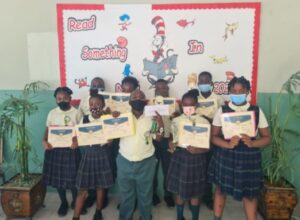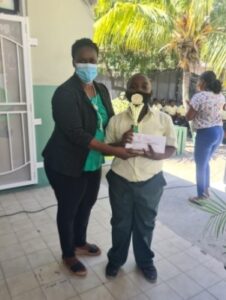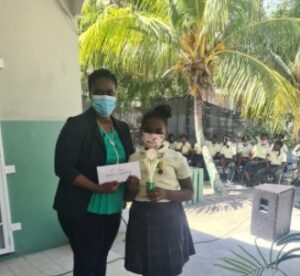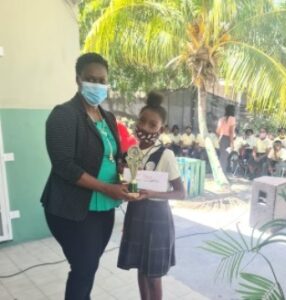#TurksandCaicos, March 11, 2022 – The Enid Capron Primary School celebrated its annual Reading Month this February under the theme: “Read Something New in 2022”. Our activities included: An Opening Ceremony, Word of the Week Competition, Teacher and Student Swap Reading Time, a Storytelling Competition, Kindergarten Pyjama Day and Speech Competition. Head of the Reading Committee, Ms. Nelene Swan, stated in her remarks: “February was a month filled with a number of exciting Reading initiatives to encourage our students to read more. It gave them the opportunity to see how reading can enhance their vocabulary and also take them anywhere in the world through pictures and stories. Overall, it was a great experience for the students and built a greater partnership with the Teachers and Parents.” Prizes included cash, story books and school supplies.
Pyjama Day and Speech Competition. Head of the Reading Committee, Ms. Nelene Swan, stated in her remarks: “February was a month filled with a number of exciting Reading initiatives to encourage our students to read more. It gave them the opportunity to see how reading can enhance their vocabulary and also take them anywhere in the world through pictures and stories. Overall, it was a great experience for the students and built a greater partnership with the Teachers and Parents.” Prizes included cash, story books and school supplies.
Enid Capron Primary School- Reading Month 2022
Speech Competition
The Annual Speech Competition was a highlight of the Reading Month celebrations. For this competition, E.C.P.S. students from Grades 4 to 6 were asked to write a 500-word essay then read it to a panel of judges and an audience on the topic: “Exploring Our Learning Options: The Hybrid Approach”.
“EXPLORING OUR LEARNING OPTIONS: THE HYBRID APPROACH”

Calvin Sejour- E.C.P.S. Speech Competition 2022: 1st Place Winner
Good morning. I am Calvin Sejour and this Tuesday morning; I will speak to you about the hybrid approach to learning. The hybrid approach comes along with the rise of education technology; schools have adopted teaching methods that diverge from the typical classroom environment. Distance learning is being used on a worldwide scale, and many educational institutions are starting to implement hybrid learning models.
However, hybrid learning is more than just tossing half of your syllabus into a virtual classroom. Instead, it is a comprehensive approach to combining the best parts of face-to-face and online learning to create the ideal learning experience. Hybrid learning is an educational model where some students attend class in person, while others join the class virtually from home. Educators teach remote and in-person students at the same time using tools like video conferencing hardware and software.
Both face-to-face and online learning have their benefits and weaknesses. The goal of hybrid learning is to combine the two formats to create a singular learning experience without any weak spots. Many schools transition to hybrid learning for flexibility: a flexible learning schedule, flexibility in teaching modes, flexibility in how students engage with their learning materials, and flexibility in collaboration and communication between peers and their instructor. For students who aren’t able to attend classes in person, the hybrid learning environment allows them to learn remotely from home.
How do some teachers feel about hybrid learning?
Most teachers saw it as the worst of all options, and hated it almost instantly. Nearly two years into the pandemic, hybrid classes have been largely locked back into the pandemic toolbox and most schools are open for full-time in-person classes. But a quieter war over hybrid teaching is still underway.
Hybrid courses are a specific mode of learning that may not suit every student. Some students procrastinate more than others; some are satisfied with barely passing a course. If you are this type of person, you may find that a hybrid course is much more time consuming and difficult for you.
Thank you.
“EXPLORING OUR LEARNING OPTIONS: THE HYBRID APPROACH”
Hello. My name is Ava Welch, a fifth-grade student at the Enid Capron Primary School.

Ava Welsh- E.C.P.S Speech Competition 2022: 2nd Place Winner
Hybrid learning is an educational approach to learning in which students appear at school, which is face-to- face learning and engages in classes online. In using my class for an example, we are split into two groups. The first group has two days, and the second group has three days. This changes every two weeks. This allows for the students to go to all classes, for example Music class which is every other week.
Websites state that hybrid learning describes an educational model in which students spend at least half of their time learning online and the rest of their time learning in physical classrooms. In my words I would just say Hybrid learning is something that happened when covid 19 started, half of a class went to school, and the other half stayed at home online.
I do not think hybrid learning is the best approach because you have some children who may have trouble navigating the online process. There are also children who are unsupervised because their parents must work, so the kids sometimes play games and do not pay attention in class. The teachers have two days a week with 1 set of students and then 3 days with the other set of students face to face. To keep the kids on the same level the teacher may have to repeat his/her lessons over again leaving less time for the whole class to learn new things.
It is my opinion that some students take advantage of online classes. One reason is because they can turn off their microphones and cameras and do whatever they desire, for example, on the days when we were fully online, some of my classmates use to lay on their comfortable beds while everyone else would sit on their wooden chairs.
People can also take advantage of face-to-face education, because they can just chat with friends and not pay any attention in class and those kids who do that will get left behind in class or work. As for me, whether online, face to face or hybrid learning, I make sure to pay attention.
Hybrid learning is something that I would recommend when covid-19 numbers are high. Overall, I do not recommend hybrid learning because I believe it is hard for students and teachers alike. ‘
Do any of you know Samajeo Williams? Well, if not, he is the Director of the National Public Health Labotory in the Turks and Caicos Islands and also, he is my amazing dad! Right now, Covid-19 numbers are low so I would not recommend hybrid learning. Face to face learning is always the best way for kids to learn.
Thank you.
“EXPLORING OUR LEARNING OPTIONS: THE HYBRID APPROACH”
A pleasant Tuesday morning to you all. My name is Deliesha Toussaint. Today, I will be talking about the Hybrid Approach and other approaches to learning. I will also share with you the one that is my favourite.

Deliesha Toussaint- E.C.P.S. Speech Competition 2022: 3rd Place Winner
What is the Hybrid approach? It is a combination of two different methodologies or systems that has the aim to create a new and better model to learning.
However, hybrid learning is more than just tossing half of your syllabus into a virtual classroom. Instead, it is a comprehensive approach to combining the best parts of face-to-face and online learning to create the ideal learning experience In some cases, hybrid classes include learning elements, like online exercises and pre-recorded video instruction, to support face-to-face classroom sessions. When planned well, hybrid courses combine the best aspects of in-person and online learning while making education more attainable for many students.
Face-to-face learning can be good especially since wifi at our homes can be slow. When the Wi-Fi is slow, the teacher thinks I am playing games but I am not. However, when we are at school for face-to-face learning we play around.
I prefer online learning. One reason I like virtual learning is that there is no fighting.
\Also, with online learning, we can sleep and the teacher will never know!
On the other hand, learning online can be very distracting. Some of us come to learn but some come to play. We do not study; we do not do our class assignments either.
Students at my school say that they like virtual school because:
- there is no fighting
- they get away with doing things without the teacher finding out about it
- they get more time to eat
I want my school to remain doing face-to-face learning even though I support the hybrid approach.
I thank you.
Photo Captions:
Header: Winning Class of the Storytelling Competition: Grade 2Fulford
1st insert: Speech Competition Finalists


 Caribbean News7 days ago
Caribbean News7 days ago
 Caribbean News7 days ago
Caribbean News7 days ago
 Caribbean News1 week ago
Caribbean News1 week ago
 Caribbean News7 days ago
Caribbean News7 days ago
 Bahamas News7 days ago
Bahamas News7 days ago
 News7 days ago
News7 days ago
 Bahamas News1 week ago
Bahamas News1 week ago
 News7 days ago
News7 days ago



















